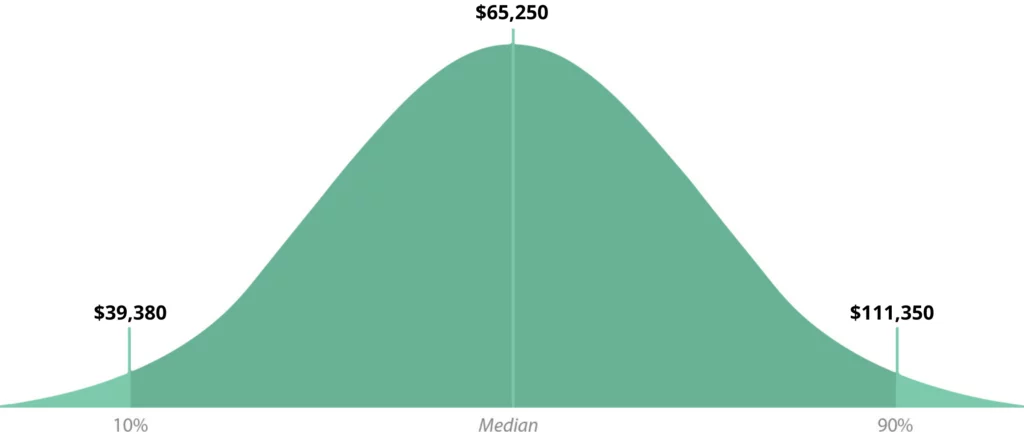
1. Overview: Job Responsibilities, Salary, and Common Requirements
2. A Comprehensive Guide to Becoming a Cost Estimator
3. What Does a Cost Estimator Do?
4. Signs You Should Consider Becoming a Cost Estimator
5. How Do You Become a Cost Estimator?
6. What are the Knowledge and Skills Needed to be a Cost Estimator?
7. Popular Schools and Colleges in the U.S. for Aspiring Cost Estimators
8. How to Get a Job as a Cost Estimator
9. Learn About Geographic and Location Pay Differentials
10. Make Your Resume Stand Out
Cost Estimators made a median salary of $65,250 in 2019. The best-paid 10 percent made $111,350 that year, while the lowest paid 10 percent made $39,380.

Accountants and Auditors
Budget Analysts
Claim Adjusters, and Appraisers
Examiners, and Investigators
Construction Managers
Financial Analysts
Financial Managers
Industrial Production Managers
Logisticians
Operations Research Analysts
Communication
Analytics
Mathematics
Time management
Cost estimation
Computer-Aided Design (CAD)
Building Information Modeling (BIM)
Cost estimators gather and evaluate different types of data in order to determine the cost of constructing infrastructure, cost of manufacturing products, or undertaking projects. The cost they identify are not only in terms of money but also in time, labor, materials, and other resources. They are an integral part of many large projects, such as construction of infrastructures, not only limited to buildings.
Cost estimators determine the value of a project or product. They calculate the possible total value based on the cost of production, construction, or manufacturing. Here are some of the more detailed responsibilities of a cost estimator:
Cost estimators have specific traits and characteristics that define them and make them successful in their careers. If you are naturally endowed with several of these traits, you might want to consider having a go at this job. Here are tell-tale signs that you can assess for yourself that would tell you whether you are cut out for this job or not:
If you appreciate the entire process of creating a budget and canvassing, you will definitely have fun in being a cost estimator. The main job of a cost estimator is figuring out how much things cost and provide estimates. At the same time, they also find out ways to cut down on costs -somewhat similar to a budget.
For a cost estimator, even the most minute details can have a significant impact on the overall cost of a project or product. That is why it is important for a cost estimator to be conscious of details. Having an eye for each detail ensures that you conduct your job with precision and that each estimate you put out is as close to reality as possible. Producing such an output is highly prized by industries since it is the basis for company costings.
Since you will be dealing with numerical estimates, a solid foundation in Mathematics is a definite advantage. You will be calculating the cost of materials, labor, and equipment for each project. These calculations need to be done with sheer accuracy. Math skills are also needed to adequately read and interpret data extracted from special software and databases.
Just like most other jobs, the ability to manage time properly is a valuable trait for cost estimators since they usually work with tight and strict deadlines. These professionals need to learn how to plan in advance so that they are better able to cope with the tasks, function effectively, and accomplish everything that they need to accomplish at any given workday.
You are an efficient communicator.
As a cost estimator, you will be working with clients and other professionals whose work relates to construction management such as engineers, architects, contractors, and businessmen. You need to be able to coordinate and communicate well with any given professional that you encounter in the course of your work. You should be able to relate to them and communicate well in order for you to achieve your goals and come up with projects of excellent quality.

Becoming a cost estimator takes only three simple steps. What you do need to make sure to be able to be successful at the job is to practice dedication as it takes years of experience to become a trusted estimator. In detail, here are the things you need to do in order for you to become a cost estimator:
A few cost estimator positions might not require a bachelor’s degree, but those jobs are usually reserved for people who have had extensive experience in construction. Usually, cost estimator jobs would require applicants to have at least a bachelor’s degree in construction management or any related field such as engineering, finance, or business. These degrees usually include courses that are highly relevant and useful for the responsibilities that the job entails.
You will find that contenders with work experience in any industry related field, on top of having a bachelor’s degree, are much more favored by employers. As mentioned above, some cost estimators get their titles despite not having a bachelor’s degree, owing to their extensive experience in terms of work.
It depends on how you started, and what level of work experience you already have. If you have been working for construction firms for a long time already, say, as a surveyor, you can advance to become a cost estimator without a degree if your employer sees you as a fit candidate.
However, if you are just starting out your career, or are just fresh out of school and have no experience at all, investing some time and resource in obtaining a bachelor’s degree can be more rewarding in the long term as you have more options to advance into positions like project management as part of your job growth.
Most industry-relevant skills would be learned on the job. Examples of these skills are computer-aided design (CAD), building information modeling, and familiarization with the specific software and databases that are used by the company. If you can learn some of these skills ahead of time to give you at least a rough idea on how to do the job smoothly, that could give you a defining advantage.
Being a cost estimator is no joke. It requires a robust set of specialized knowledge and skills that would enable one to perform the tasks and responsibilities that come with the job. Here are some of the most crucial knowledge and skills that are needed to be a cost estimator:
Computer-aided design (CAD) software like AutoCAD involves the use of computers in creating, modifying, analyzing, or optimizing a design. CAD was created to help increase efficiency in design, improve the quality of a designer’s output, document designs, and create databases for manufacturing.
There are many perks in learning CAD, as a cost estimator, it is not only useful but also, and more importantly, required. Some CAD software provides automatic cost estimation along with the design, and that is one crucial data that cost estimators need to work with.
Building Information Modeling (BIM) is a process that is widely used by professionals in the architecture, construction, and engineering field to gather insights and tools in order to better plan and execute designs. It is also useful in infrastructure management.
Since cost estimators fall under this field of profession, it is only right that they should have some understanding of BIM. The entire process is made up of various tools and technologies that you should also be familiar with.
As expected, cost estimators need to have the fundamentals of cost estimation down to the core. Cost estimating is a process that produces a single value estimate that is made up of several component values. These are usually derived from materials used in engineering and construction when you are in the job, as well as how to estimate the time allocation as part of manpower resource cost estimates.
It is only natural for a profession that deals largely with numbers to require some high-level analytical skills. As a cost estimator, you will be evaluating and considering various manufacturing and construction methods. You will be presented with several different options, and you have to carefully analyze each one so that you can decide on the best method that meets the desired specifications while demanding the least cost.
Cost estimators have exposure to both sides of a project -the engineering and the business side. It is, therefore, important to have some business intelligence. Some cost estimators are even business graduates, and that’s because a significant portion of a cost estimator’s job revolves around the business side of things. Cost is a major element in running a business, and to be able to achieve success, one should have the fundamentals of proper costing and financial management.
Construction management software and cost estimating software allows you to have a better overview of the project workflows, and the project plan and helps you better understand whether a project is profitable before it’s finished. Plus, you can always check the project progress and align your estimations accordingly. You’ll also need to learn estimate and invoice software like Joist to automate some of your tasks, eliminating project redundancies.
Below are some of the most popular schools that offer degrees in Construction Management:
For Civil Engineering degrees, below are some of the most top-rated schools:
And for Business and Finance courses, check out these prime universities:

Looking for a cost estimator job near you? It might be less tricky if you try out the following cost-estimator job hunting suggestions:
You can directly apply for cost estimation positions in companies that require such service. There are actually a couple of industries where cost estimation is in-demand. Below are the top industries that hire cost estimators:
These firms provide services that specialize in specific areas of the building construction process or non-building related tasks. 35%, the largest concentration of cost estimators, are found in specialty trade contractors; and that is because specialty trade is comprised of numerous industries that cost estimators can get into. Here is a breakdown of the different industries that specialty trade contractors serve:
Construction firms have some of the highest concentrations of cost estimators in the industry. In this field, cost estimators are responsible for forecasting the cost of building a structure. The cost estimates that they provide then used by project owners and businessmen to determine the value and scope of a project, how to allocate funds, as well as its feasibility.
For a more in-depth look at the role of cost estimation in construction, check out this article, which tackles construction cost estimating.
Around 12% of cost estimators are found in manufacturing. The manufacturing industry will always have a place for cost estimators because of the importance of the role that they play. Cost estimators estimate the time, money, labor, and materials required to make the act of manufacturing possible. Most of the time, estimators specialize in a specific product or line that a manufacturing facility produces. This is because different products undergo different processes, require different materials, and have different costs.
Another industry that requires the services of cost estimators is automotive repair and maintenance. Around 7% of cost estimators are found in this field. During the course of auto repair and maintenance, price quotations are a regular requirement. Costing for service or labor, as well as materials, are often requested by patrons prior to availing automotive services.
Constructing buildings is vastly different from constructing non-building structures like bridges. It requires a different level of engineering, different processes, and different materials that may affect cost.
Here are some examples of heavy civil construction that make use of civil engineering principles:
Probably the easiest way to find cost estimator jobs is by searching online. There are various job search engines that you can choose from, and many of them post cost estimator jobs from different companies and industries. You can even create a profile in which potential employers can check you out and invite you to apply.
Here are some of the most popular job search websites today:
In case you are already employed in the construction or engineering field of duty, you might not need to look too far for a cost estimator job. Sometimes, companies like to do internal hiring because this eliminates the need to acclimate new members into the culture. Internal hiring also has other benefits, such as:
Cost estimator salaries vary from state to state. If you want a bigger pay, you should try to consider relocating to states where the compensation is a bit higher. Here is a table comparison of the cost estimator pay differentials per state according to the Bureau of Labor Statistics:
| State | 2019 Mean Annual Wage |
|---|---|
| Alaska | $ 85,450 |
| Hawaii | $ 85,120 |
| Massachusetts | $ 81,270 |
| Connecticut | $ 79,780 |
| California | $ 79,610 |
| New York | $ 78,120 |
| Washington | $ 76,860 |
| New Jersey | $ 75,880 |
| Texas | $ 75,250 |
| Colorado | $ 74,630 |
| Virginia | $ 74,210 |
| Maryland | $ 73,950 |
| Wyoming | $ 72,910 |
| Illinois | $ 71,890 |
| Missouri | $ 71,620 |
| Oregon | $ 71,270 |
| Georgia | $ 70,760 |
| Rhode Island | $ 70,630 |
| Delaware | $ 70,500 |
| Pennsylvania | $ 69,740 |
| North Dakota | $ 69,730 |
| Utah | $ 69,450 |
| Iowa | $ 68,530 |
| Louisiana | $ 68,440 |
| Minnesota | $ 68,130 |
| State | 2019 Mean Annual Wage |
|---|---|
| Vermont | $ 67,730 |
| Arizona | $ 67,710 |
| Tennessee | $ 67,710 |
| Ohio | $ 67,030 |
| West Virginia | $ 67,020 |
| Kansas | $ 66,780 |
| Nevada | $ 66,770 |
| New Hampshire | $ 66,770 |
| Maine | $ 66,290 |
| Kentucky | $ 65,430 |
| Michigan | $ 65,110 |
| Oklahoma | $ 63,520 |
| Indiana | $ 64,820 |
| Florida | $ 64,000 |
| North Carolina | $ 63,930 |
| Mississippi | $ 63,840 |
| Arkansas | $ 62,870 |
| South Carolina | $ 62,490 |
| Alabama | $ 60,840 |
| Idaho | $ 60,540 |
| Wisconsin | $ 60,380 |
| Nebraska | $ 59,480 |
| New Mexico | $ 59,450 |
| Montana | $ 59,070 |
| South Dakota | $ 57,660 |
Report from the Bureau of Labor Statistics
With so many job applicants out there, you should aim to get noticed -in a good light. Your resume can easily do this for you, provided that you know how to tweak it in such a way that it not only catches but also retains the readers’ attention. Here are a few resume writing tips you can try when making your resume:
Choose a plain white or neutral-colored background for your resume. Avoid distracting colors that might be unpleasant and unprofessional-looking to the hiring manager. Additionally, choose a plain and professional-looking font that is simple and easy to read. Avoid cursives at all costs since those can sometimes be hard to decipher and may make your resume end up looking like a wedding invitation. It would be best if you also avoided chunky or awkward-looking fonts. The goal of crafting your resume is to look serious and not funny or artsy.
Hiring managers go through so many applications on any given day. The hiring manager who reads your resume will likely be in a rush. If you wind them along with lengthy sentences and paragraphs, you might quickly lose their interest and lose your chance at being noticed. Lengthy paragraphs are one of the reasons why some resumes never get noticed.
Instead, write important details in bullets so that the one who reads it can quickly scan through it and get the gist of your qualifications without wasting much time.
Since experience can play to your advantage in this type of job, it would be advantageous for you to detail your work experience first -starting from the most recent and then down to your first. This way, your potential employer will see your most relevant experience and how it makes you the perfect candidate for the job.
If you have any additional credentials such as certification in specialized software like CAD, make sure to include those and highlight them in your resume. Place them at the top or a boxed corner where they will be noticed. Having credentials to relevant special skills makes you a more favorable candidate in the eyes of an employer since it means that you have invested in your skills, and you are a potentially valuable team member if they choose to hire you.
Once your resume gets through, it’s time to prepare for your interview. Here are a few examples of interview questions you might encounter when applying for a cost estimator job and how you can tackle each:
There are a lot of software programs that are available for you to determine cost estimates. These electronic resources are available for professionals to be able to come up with the most accurate results. This question aims to uncover how tech-savvy an applicant is when it comes to technologies that may be useful in the job. You should be able to name a couple of software programs that professional cost estimators commonly use.
Part of your role as a cost estimator is to present finished reports to decision-makers. The reports you produce will be used by them to come up with logical decisions in terms of how a project may proceed and how it will be budgeted. Not only do you need to relay information, but you should also be able to deliver it clearly enough so that it is understood by all -even and especially the ones who have to background in cost estimation.
Every estimator has his or her own process in coming up with cost analysis. When answering this question, try to walk the listener through the steps that you undertake when determining costs. If you can, it would be better to provide an example of a project or situation wherein you come up with a cost analysis in the end. Your process shows the employer how you work, what methods matter to you the most, and whether or not you are a suitable candidate to match the company’s needs.
There are situations where your reports might not be as accurate as needed, and this might have some repercussions on the project or construction at hand. This question does not test your perfection, but rather your resilience and how you cope with adversity. If you can, try to recount instances when things didn’t go as planned and how you dealt with it. Give them a glimpse of your abilities to adapt to change and recover from setbacks.
Sharpen your skills in cost estimation by taking these top online courses
Here are some carefully curated online courses that you can take to level up your knowledge at work and give you a defining edge against others in the field:






